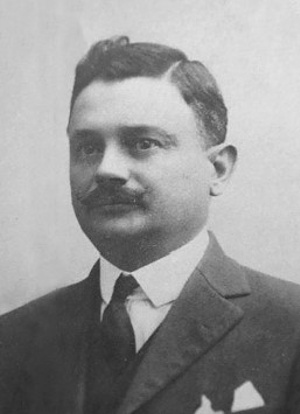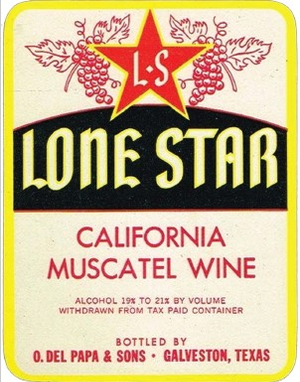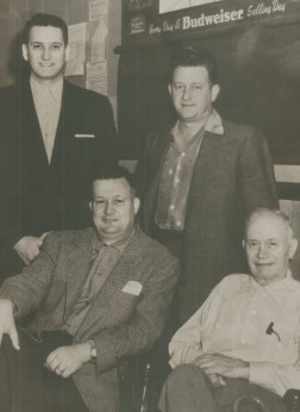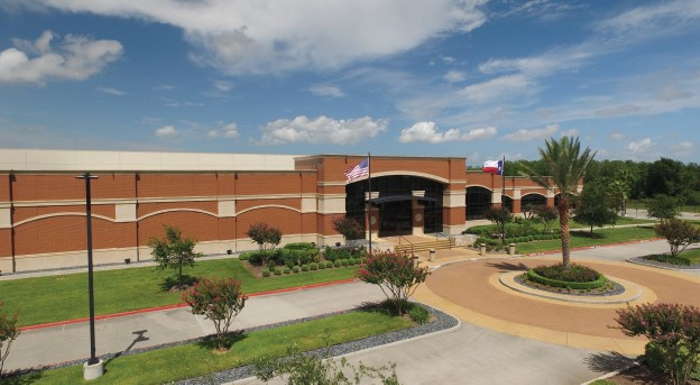The fertile sands of Galveston cultivate not wheat, soy, or
cotton, but success. The 19th century pioneers who transformed a
tiny island into a powerhouse of creative entrepreneurship and international
commerce set a standard of excellence for Galveston
that has magnificently shapeshifted into myriad forms over the 20th
century and today, yet always remained constant. At times, this remarkable
evolution has taken place not only collectively, but also within a single
family. Nourished by a legacy deeply rooted in a city that honors innovation
and forward thinking, some families have recognized like Galveston their enduring ability to adapt,
overcome, and modernize, all while paying homage to their history. One such
family name is literally on the lips of people across Texas, thousand of times every day - Del
Papa.
 Omero Del Papa was only 21 years old in 1903 when he opened his first
grocery store at 2728 Avenue L, but he was already long acquainted with
ambition. As a child in Lucca, Italy, he was enraptured by the promise of America, where
a solid work ethic was practically currency, where honesty and integrity were
considered investments, and where a good name was one’s most valuable asset.
Omero Del Papa was only 21 years old in 1903 when he opened his first
grocery store at 2728 Avenue L, but he was already long acquainted with
ambition. As a child in Lucca, Italy, he was enraptured by the promise of America, where
a solid work ethic was practically currency, where honesty and integrity were
considered investments, and where a good name was one’s most valuable asset.
Omero
arrived in Galveston with his family in 1892,
when it was the largest, most important city in Texas with opportunity on every doorstep. He
worked in a cotton press and a bagging company before taking a job at his uncle’s
grocery store at 15th and Avenue K, where he started out cleaning
spittoons for a dime per day. A dedicated employee who was keenly in tune with
the operations, Omero was steadily given more and more responsibility and
eventually decided to venture out on his own.
But first he would witness the other side of Galveston’s precarious coin in 1900, as he
clung to a tree in the middle of an ocean where once stood a city. The vicious
wind and unrelenting rain pelted Omero’s skin and stung his eyes, making him
unable to see the deadliest storm in American history as it drowned Galveston’s golden shore
and undulating economy.
However,
like so many others who survived, the Great Storm did nothing to diminish
Omero’s resolve. He and other like-minded individuals vowed to resurrect their
island home and did so, much to the benefit of future generations.
As the seawall was constructed and the grade-raising commenced, Omero’s
young business thrived. While many of his family members found themselves
longing for their native land and eventually returned, Omero knew that Galveston was his home
now. And somehow, as he looked around his quaint little store with every item
meticulously placed and planned, he also knew this was only the beginning.
However,
Omero was prompted to at least visit his hometown of Lucca, and this fortuitous decision led to
his introduction to Giorgina Celli. They were immediately smitten with one
another.
The pair made a quick study of Cupid’s arrow and married in the village
parish by the time Omero’s vacation was ended. When Celli arrived in Galveston, she was
reunited with her brother Frank who had lived there since 1902 and was familiar
with the town.
Omero
soon discovered that his marriage included the unexpected bonus of an astute
business partner in Frank, and the combination of their individual experiences
inspired him to see a larger potential in his Galveston enterprise. Reaching more customers
meant making the precarious transition from established retailer to unknown wholesaler,
but having a partner mitigated the risk. In 1910, Celli & Del Papa
Distributing, Wholesale Dealers opened their warehouse at 2401 Strand Street.
Celli & Del Papa focused on high-quality imports such as olive oil,
ice cream, and other delicacies, but the largest driver of profit was beer.
They acquired several accounts from popular brands of the era, but the coveted
Anheuser-Busch distributorship belonged to a man named Moritz Brock.
Unfortunately,
businesses small and large were in the same boat when the Eighteenth Amendment
was ratified in January 1920. Federal Prohibition only made the bootleggers and
rumrunners rich, law-abiding men such as Omero resisted the temptation to
profit from the black-market created in its wake. He made the difficult
decision to liquidate his commercial assets, dissolve the partnership with
Celli, and return to Lucca
with his wife and four children: Omero, Jr., Velma, Ivaldo, and Jenny.
Georgina gave birth to her fifth and final child Lawrence while in Italy, but despite the joys, Omero never ceased
pining for Galveston
nor the future it promised him. For ten years, he patiently bided his time
while maintaining his U.S.
citizenship, keeping a close eye on island commerce, and planning his eventual
return.
Finally,
in 1930, Omero sensed that public support of Prohibition was rapidly waning,
especially since the onset of an international economic recession. Undaunted by
the decade-long interruption of his business plan, he packed up his family and
returned to Galveston
to start over - again. But this time, he had experience.
Omero’s perseverance was rewarded with spectacular timing. Immediately
upon his return, he was able to purchase an established wholesale dealership
called the P. Romano Company with an office and warehouse advantageously
located between 20th and 21st Streets in the heart of the
Strand commercial district. Knowing innately
that motivation drives sales, Omero decided that his employees would work on
commission and renamed the firm to reflect this philosophy.
Three
of the earliest employees at the O. Del Papa Commission Company were siblings
Omero, Jr., Ivaldo, and Jenny who worked in the office. Also put to work were
the intangible assets that had propelled Omero’s previous success.
“[My
name] was all I had,” he recalled later in life. “But it was all I needed.
People remembered. My friends remembered. And I started back - and succeeded.”
This time around, Omero accomplished in months what had once taken him
years. His reputation was so well-established, and so quickly, that he was soon
poised to acquire the deal that would cement his legacy well into the 21st
century. When Moritz Brock passed away in the summer of 1930, mere months after
Omero’s arrival in Galveston,
Del Papa emerged as the
front-runner to take over the Galveston-area distribution for Anheuser Busch
helped in part by a glowing recommendation from restaurateur Mike Gaido.
 Anheuser Busch officially named the O. Del Papa Commission Company its Galveston distributor on August
17. While Omero was in Lucca,
AB had been doing its best to
navigate unknown waters, subsidizing the beer business with alternative
products like baker’s yeast, ice cream, malt, and a non-alcoholic beer called
“Bevo.” At the time they made the now-historic deal with Del Papa, both
companies were still reeling from the vice grip of temperance, and the odds of
their success were further stagnated by the fact that the country’s economy was
being cannibalized by the Great Depression.
Anheuser Busch officially named the O. Del Papa Commission Company its Galveston distributor on August
17. While Omero was in Lucca,
AB had been doing its best to
navigate unknown waters, subsidizing the beer business with alternative
products like baker’s yeast, ice cream, malt, and a non-alcoholic beer called
“Bevo.” At the time they made the now-historic deal with Del Papa, both
companies were still reeling from the vice grip of temperance, and the odds of
their success were further stagnated by the fact that the country’s economy was
being cannibalized by the Great Depression.
But
each company was bolstered by the other’s similar vision and faith in the
future of the industry, as well as their common threads of family, hard work,
and integrity, and it only took three years for the most doomed deal in history
to rebrand itself as a stroke of genius.
On September 15, 1933, the front page of the Galveston Daily News announced
the repeal of Prohibition with a headline that read, “Happy Days are Here
Again,” a sentiment never more accurate than it was for Del Papa and Anheuser
Busch. The brewing company amplified their rebirth with the advent of canned
beer, and Omero’s efficient and immaculately organized business operation had
no problem growing and innovating its model to keep up with the demand while
simultaneously expanding its own reach.
 A
single-truck operation in 1930 ballooned into a fleet of delivery vehicles by
1937 that serviced fourteen routes and covered territory from Rosenberg to Winnie. That same year, Omero
renamed the company O. Del Papa & Sons, moved his base to an even larger
building at 2101 Strand, and diversified his
offerings by obtaining a wine bottler’s permit.
A
single-truck operation in 1930 ballooned into a fleet of delivery vehicles by
1937 that serviced fourteen routes and covered territory from Rosenberg to Winnie. That same year, Omero
renamed the company O. Del Papa & Sons, moved his base to an even larger
building at 2101 Strand, and diversified his
offerings by obtaining a wine bottler’s permit.
When the ravages of World War II reached the American shores of Pearl Harbor in 1941, Omero found himself floundering
personally and professionally once again. His two oldest sons and trusted
business associates were drafted into the army, and Omero was unable to
maintain the diversity of his distribution portfolio. However, this trial would
yet again give way to a rousing victory.
 The
absence of his sons compelled Omero to divest from wholesale grocery items and
focus solely on beer and wine, but the transition to exclusivity proved only to
fortify his business. By limiting Del Papa’s horizontal output, all the
company’s resources were diverted to improving and enlarging their most
profitable enterprise, which in turn made it even more profitable.
The
absence of his sons compelled Omero to divest from wholesale grocery items and
focus solely on beer and wine, but the transition to exclusivity proved only to
fortify his business. By limiting Del Papa’s horizontal output, all the
company’s resources were diverted to improving and enlarging their most
profitable enterprise, which in turn made it even more profitable.
Omero’s legacy of faith, family, and endless innovation continued even
after his retirement in 1950, as his sons Ivaldo, Omero, Jr., and Lawrence each brought their
own unique talents to the fore. And they continue today, 109 years later, as
the company is still operated by direct descendants of Omero who know firsthand
the value of their patriarch’s emphasis on hard work and a good name. Now known
as Del Papa Distributing, the company maintains its relationship with Anheuser
Busch and is consistently awarded their top honors in distribution.
Locally,
their three distribution centers in Texas City, Victoria, and Beaumont
already lead with the largest market share in each of their territories, but
consistent growth continues to accelerate these claims and annually widens the
gap between Del Papa and its competitors even further. Del Papa is also a
leader in technological advancements, recently implementing the Pick-to-Light™
system in their warehouses which increases both productivity and the quality of
life of their workers.
The company also strives to stay in tune with their consumer base and
their communities. At their new warehouse located in Texas
City, which replaced the former Galveston headquarters, they host free
monthly tasting events on the third Thursday of every month.
 “The
beer industry is changing so much,” says Caylin Wiebe of Del Papa Distributing,
“There is such a diversity of selection now, our tastings are a fun way to
learn about all the different kinds of beer now available.”
“The
beer industry is changing so much,” says Caylin Wiebe of Del Papa Distributing,
“There is such a diversity of selection now, our tastings are a fun way to
learn about all the different kinds of beer now available.”
Most importantly, the modern incarnation of Del Papa seeks to give back
to the people who have given it so much as they continue another of Omero’s Galveston traditions - philanthropy.
In 2016, Del Papa donated $1 million to the University of Texas Medical
Branch to establish the Lawrence J. Del Papa
Chair in Neurodegenerative Research.
Del
Papa is no longer located on Galveston
Island, but its legacy of
success, persistence, and community will never be separate from the city that
launched a thousand trucks.
For more information on Del Papa’s
brands or the free monthly tastings, visit www.DelPapaDistributing.com.
e fertile sands of Galveston cultivate not wheat, soy, or
cotton, but success. The 19th century pioneers who transformed a
tiny island into a powerhouse of creative entrepreneurship and international
commerce set a standard of excellence for Galveston
that has magnificently shapeshifted into myriad forms over the 20th
century and today, yet always remained constant. At times, this remarkable
evolution has taken place not only collectively, but also within a single
family. Nourished by a legacy deeply rooted in a city that honors innovation
and forward thinking, some families have recognized like Galveston their enduring ability to adapt,
overcome, and modernize, all while paying homage to their history. One such
family name is literally on the lips of people across Texas, thousand of times every day - Del
Papa.
Omero Del Papa was only 21 years old in 1903 when he opened his first
grocery store at 2728 Avenue L, but he was already long acquainted with
ambition. As a child in Lucca, Italy, he was enraptured by the promise of America, where
a solid work ethic was practically currency, where honesty and integrity were
considered investments, and where a good name was one’s most valuable asset.
Omero
arrived in Galveston with his family in 1892,
when it was the largest, most important city in Texas with opportunity on every doorstep. He
worked in a cotton press and a bagging company before taking a job at his uncle’s
grocery store at 15th and Avenue K, where he started out cleaning
spittoons for a dime per day. A dedicated employee who was keenly in tune with
the operations, Omero was steadily given more and more responsibility and
eventually decided to venture out on his own.
But first he would witness the other side of Galveston’s precarious coin in 1900, as he
clung to a tree in the middle of an ocean where once stood a city. The vicious
wind and unrelenting rain pelted Omero’s skin and stung his eyes, making him
unable to see the deadliest storm in American history as it drowned Galveston’s golden shore
and undulating economy.
However,
like so many others who survived, the Great Storm did nothing to diminish
Omero’s resolve. He and other like-minded individuals vowed to resurrect their
island home and did so, much to the benefit of future generations.
As the seawall was constructed and the grade-raising commenced, Omero’s
young business thrived. While many of his family members found themselves
longing for their native land and eventually returned, Omero knew that Galveston was his home
now. And somehow, as he looked around his quaint little store with every item
meticulously placed and planned, he also knew this was only the beginning.
However,
Omero was prompted to at least visit his hometown of Lucca, and this fortuitous decision led to
his introduction to Giorgina Celli. They were immediately smitten with one
another.
The pair made a quick study of Cupid’s arrow and married in the village
parish by the time Omero’s vacation was ended. When Celli arrived in Galveston, she was
reunited with her brother Frank who had lived there since 1902 and was familiar
with the town.
Omero
soon discovered that his marriage included the unexpected bonus of an astute
business partner in Frank, and the combination of their individual experiences
inspired him to see a larger potential in his Galveston enterprise. Reaching more customers
meant making the precarious transition from established retailer to unknown wholesaler,
but having a partner mitigated the risk. In 1910, Celli & Del Papa
Distributing, Wholesale Dealers opened their warehouse at 2401 Strand Street.
Celli & Del Papa focused on high-quality imports such as olive oil,
ice cream, and other delicacies, but the largest driver of profit was beer.
They acquired several accounts from popular brands of the era, but the coveted
Anheuser-Busch distributorship belonged to a man named Moritz Brock.
Unfortunately,
businesses small and large were in the same boat when the Eighteenth Amendment
was ratified in January 1920. Federal Prohibition only made the bootleggers and
rumrunners rich, law-abiding men such as Omero resisted the temptation to
profit from the black-market created in its wake. He made the difficult
decision to liquidate his commercial assets, dissolve the partnership with
Celli, and return to Lucca
with his wife and four children: Omero, Jr., Velma, Ivaldo, and Jenny.
Georgina gave birth to her fifth and final child Lawrence while in Italy, but despite the joys, Omero never ceased
pining for Galveston
nor the future it promised him. For ten years, he patiently bided his time
while maintaining his U.S.
citizenship, keeping a close eye on island commerce, and planning his eventual
return.
Finally,
in 1930, Omero sensed that public support of Prohibition was rapidly waning,
especially since the onset of an international economic recession. Undaunted by
the decade-long interruption of his business plan, he packed up his family and
returned to Galveston
to start over - again. But this time, he had experience.
Omero’s perseverance was rewarded with spectacular timing. Immediately
upon his return, he was able to purchase an established wholesale dealership
called the P. Romano Company with an office and warehouse advantageously
located between 20th and 21st Streets in the heart of the
Strand commercial district. Knowing innately
that motivation drives sales, Omero decided that his employees would work on
commission and renamed the firm to reflect this philosophy.
Three
of the earliest employees at the O. Del Papa Commission Company were siblings
Omero, Jr., Ivaldo, and Jenny who worked in the office. Also put to work were
the intangible assets that had propelled Omero’s previous success.
“[My
name] was all I had,” he recalled later in life. “But it was all I needed.
People remembered. My friends remembered. And I started back - and succeeded.”
This time around, Omero accomplished in months what had once taken him
years. His reputation was so well-established, and so quickly, that he was soon
poised to acquire the deal that would cement his legacy well into the 21st
century. When Moritz Brock passed away in the summer of 1930, mere months after
Omero’s arrival in Galveston,
Del Papa emerged as the
front-runner to take over the Galveston-area distribution for Anheuser Busch
helped in part by a glowing recommendation from restaurateur Mike Gaido.
Anheuser Busch officially named the O. Del Papa Commission Company its Galveston distributor on August
17. While Omero was in Lucca,
AB had been doing its best to
navigate unknown waters, subsidizing the beer business with alternative
products like baker’s yeast, ice cream, malt, and a non-alcoholic beer called
“Bevo.” At the time they made the now-historic deal with Del Papa, both
companies were still reeling from the vice grip of temperance, and the odds of
their success were further stagnated by the fact that the country’s economy was
being cannibalized by the Great Depression.
But
each company was bolstered by the other’s similar vision and faith in the
future of the industry, as well as their common threads of family, hard work,
and integrity, and it only took three years for the most doomed deal in history
to rebrand itself as a stroke of genius.
On September 15, 1933, the front page of the Galveston Daily News announced
the repeal of Prohibition with a headline that read, “Happy Days are Here
Again,” a sentiment never more accurate than it was for Del Papa and Anheuser
Busch. The brewing company amplified their rebirth with the advent of canned
beer, and Omero’s efficient and immaculately organized business operation had
no problem growing and innovating its model to keep up with the demand while
simultaneously expanding its own reach.
A
single-truck operation in 1930 ballooned into a fleet of delivery vehicles by
1937 that serviced fourteen routes and covered territory from Rosenberg to Winnie. That same year, Omero
renamed the company O. Del Papa & Sons, moved his base to an even larger
building at 2101 Strand, and diversified his
offerings by obtaining a wine bottler’s permit.
When the ravages of World War II reached the American shores of Pearl Harbor in 1941, Omero found himself floundering
personally and professionally once again. His two oldest sons and trusted
business associates were drafted into the army, and Omero was unable to
maintain the diversity of his distribution portfolio. However, this trial would
yet again give way to a rousing victory.
The
absence of his sons compelled Omero to divest from wholesale grocery items and
focus solely on beer and wine, but the transition to exclusivity proved only to
fortify his business. By limiting Del Papa’s horizontal output, all the
company’s resources were diverted to improving and enlarging their most
profitable enterprise, which in turn made it even more profitable.
Omero’s legacy of faith, family, and endless innovation continued even
after his retirement in 1950, as his sons Ivaldo, Omero, Jr., and Lawrence each brought their
own unique talents to the fore. And they continue today, 109 years later, as
the company is still operated by direct descendants of Omero who know firsthand
the value of their patriarch’s emphasis on hard work and a good name. Now known
as Del Papa Distributing, the company maintains its relationship with Anheuser
Busch and is consistently awarded their top honors in distribution.
Locally,
their three distribution centers in Texas City, Victoria, and Beaumont
already lead with the largest market share in each of their territories, but
consistent growth continues to accelerate these claims and annually widens the
gap between Del Papa and its competitors even further. Del Papa is also a
leader in technological advancements, recently implementing the Pick-to-Light™
system in their warehouses which increases both productivity and the quality of
life of their workers.
The company also strives to stay in tune with their consumer base and
their communities. At their new warehouse located in Texas
City, which replaced the former Galveston headquarters, they host free
monthly tasting events on the third Thursday of every month.
“The
beer industry is changing so much,” says Caylin Wiebe of Del Papa Distributing,
“There is such a diversity of selection now, our tastings are a fun way to
learn about all the different kinds of beer now available.”
Most importantly, the modern incarnation of Del Papa seeks to give back
to the people who have given it so much as they continue another of Omero’s Galveston traditions - philanthropy.
In 2016, Del Papa donated $1 million to the University of Texas Medical
Branch to establish the Lawrence J. Del Papa
Chair in Neurodegenerative Research.
Del
Papa is no longer located on Galveston
Island, but its legacy of
success, persistence, and community will never be separate from the city that
launched a thousand trucks.
For more information on Del Papa’s
brands or the free monthly tastings, visit www.DelPapaDistributing.com.